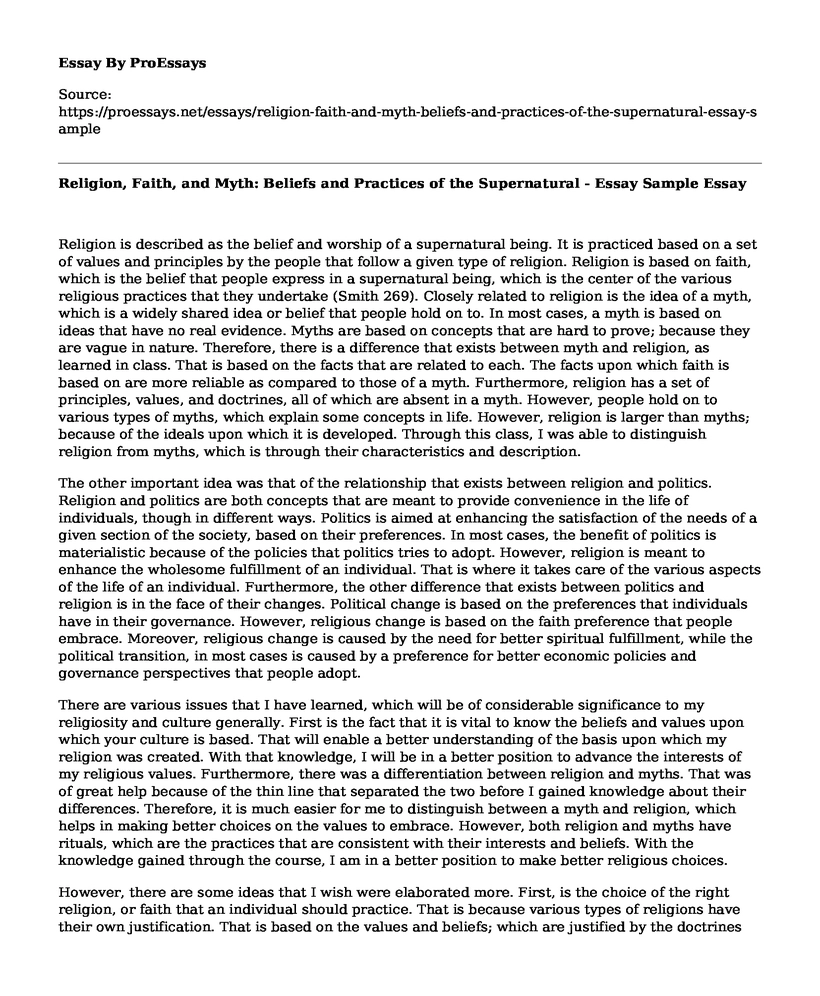Religion is described as the belief and worship of a supernatural being. It is practiced based on a set of values and principles by the people that follow a given type of religion. Religion is based on faith, which is the belief that people express in a supernatural being, which is the center of the various religious practices that they undertake (Smith 269). Closely related to religion is the idea of a myth, which is a widely shared idea or belief that people hold on to. In most cases, a myth is based on ideas that have no real evidence. Myths are based on concepts that are hard to prove; because they are vague in nature. Therefore, there is a difference that exists between myth and religion, as learned in class. That is based on the facts that are related to each. The facts upon which faith is based on are more reliable as compared to those of a myth. Furthermore, religion has a set of principles, values, and doctrines, all of which are absent in a myth. However, people hold on to various types of myths, which explain some concepts in life. However, religion is larger than myths; because of the ideals upon which it is developed. Through this class, I was able to distinguish religion from myths, which is through their characteristics and description.
The other important idea was that of the relationship that exists between religion and politics. Religion and politics are both concepts that are meant to provide convenience in the life of individuals, though in different ways. Politics is aimed at enhancing the satisfaction of the needs of a given section of the society, based on their preferences. In most cases, the benefit of politics is materialistic because of the policies that politics tries to adopt. However, religion is meant to enhance the wholesome fulfillment of an individual. That is where it takes care of the various aspects of the life of an individual. Furthermore, the other difference that exists between politics and religion is in the face of their changes. Political change is based on the preferences that individuals have in their governance. However, religious change is based on the faith preference that people embrace. Moreover, religious change is caused by the need for better spiritual fulfillment, while the political transition, in most cases is caused by a preference for better economic policies and governance perspectives that people adopt.
There are various issues that I have learned, which will be of considerable significance to my religiosity and culture generally. First is the fact that it is vital to know the beliefs and values upon which your culture is based. That will enable a better understanding of the basis upon which my religion was created. With that knowledge, I will be in a better position to advance the interests of my religious values. Furthermore, there was a differentiation between religion and myths. That was of great help because of the thin line that separated the two before I gained knowledge about their differences. Therefore, it is much easier for me to distinguish between a myth and religion, which helps in making better choices on the values to embrace. However, both religion and myths have rituals, which are the practices that are consistent with their interests and beliefs. With the knowledge gained through the course, I am in a better position to make better religious choices.
However, there are some ideas that I wish were elaborated more. First, is the choice of the right religion, or faith that an individual should practice. That is because various types of religions have their own justification. That is based on the values and beliefs; which are justified by the doctrines they have developed. Therefore, it is challenging to find and choose the right religion. Moreover, the interrelationship between religion and politics should be highlighted. That is because, currently, the two are found to be interdependent in some circumstances. An example is a regulation of the church by the government, as well as the critic of the government by religious institutions. There is a dilemma on which party's principles an individual should follow. Through the class, I have gained much insight into the various issues upon which religion is based, which have enabled me to embrace religion from multiple perspectives.
Works Cited
Smith, Jonathan Z. "Religion, religions, religious." Critical terms for religious studies 1998 (1998): 269-284. https://books.google.co.ke/books?hl=en&lr=&id=zhc7UkW8eHcC&oi=fnd&pg=PA269&dq=religion+&ots=ufNd1pLlu8&sig=bYnbdlfd13awjjldW6BG6GKpKPo&redir_esc=y#v=onepage&q=religion&f=false
Cite this page
Religion, Faith, and Myth: Beliefs and Practices of the Supernatural - Essay Sample. (2023, Jul 05). Retrieved from https://proessays.net/essays/religion-faith-and-myth-beliefs-and-practices-of-the-supernatural-essay-sample
If you are the original author of this essay and no longer wish to have it published on the ProEssays website, please click below to request its removal:
- Leader Theory and Biblical Worldview - Essay Example
- Whether God Exists Essay
- Is There Existence of God?
- Essay Example on Christian's Biblical Worldview: Purpose, Influence, Interaction
- Essay Example on The Dalai Lama: Icon of Buddhism, Leader of Activism
- Existence of God - Essay Example
- Paper Example on Women's Role in the Bible







